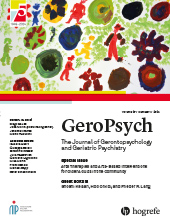Curriculum Gerontopsychiatrie und -psychotherapie
Abstract
Auf dem Weg zu einer ärztlichen Schwerpunktbildung für die Gerontopsychiatrie und -psychotherapie wählte die Deutsche Akademie für Gerontopsychiatrie und -psychotherapie ein «bottom-up-Vorgehen». In einem mehrjährigen Prozess (2001–2004) definierte ein Kreis von Experten die Inhalte des Gebietes sowie die notwendigen Einstellungen, Kenntnisse und Fertigkeiten. Diese wurden in einem deutschsprachigen – unter Einbeziehung österreichischer und schweizerischer Experten – und interdisziplinären Gremium konsentiert. Das Ergebnis wird hier vorgestellt. Eine englischsprachige Version liegt inzwischen ebenfalls vor.
Trying to establish a subspecialisation in geriatric psychiatry the German Academy of Gerontopsychiatry and -psychotherapy chose a «bottom-up-approach». During the years 2001–2004 previously selected experts defined the content of their respective areas and the necessary knowledge, attitudes and skills, respectively. During a conference involving also Austrian and German speaking Swiss experts as well as experts from neighbours disciplines, a consensus was reached, which is presented in this paper. An English version is meanwhile available.
Literatur
on behalf of the WPA section on old age psychiatry. (2003). Teaching and training in old age psychiatry: a general survey of the World Psychiatric Association member societies. International Journal of Geriatric Psychiatry, 18, 694–9.
(2003). Stigma and discrimination against older people with mental disorders in Europe. International Journal of Geriatric Psychiatry, 18, 679–82.
(2003). Training in old age psychiatry. Editorial. International Journal of Geriatric Psychiatry, 18, 683–5.
(2003). Skill-based objectives for specialist training in old age psychiatry. International Journal of Geriatric Psychiatry, 18, 686–93.
(1994). Weiterbildung in Gerontopsychiatrie und -psychotherapie im Rahmen der Facharzt-Weiterbildung «Psychiatrie und Psychotherapie». In , Gerontopsychiatrie im Wandel: vom Defizit zur Kompetenz (S. 249–272). Melsungen: Bibliomed.
(1997). Ärztliche Weiter- und Fortbildung in der Gerontopsychiatrie und -psychotherapie. Zeitschrift für Gerontologie und Geriatrie, 30, 89–93.
. (1998). Higher specialist training handbook. Occasional Paper OP 43, London.
(1993). Geriatric Psychiatry: Training guidelines and their application. Canadian Journal of Psychiatry, 38, 90–5.
. (2003). Curriculum. www.sgap-sppa.ch.
(2001). Gerontopsychiatrie – wozu? Niedersächsisches Ärzteblatt, 8, 13–7.
. (2002.) Reducing stigma and discrimination against older people with mental disorders. A technical consensus statement. Geneva: WHO.


